The Brilliant Mind Behind Harry Potter

Photo: Getty Images
In July 2007, Jo's final book in the series, Harry Potter and the Deathly Hallows, was released. It went on to become the fastest-selling book of all time when fans bought 8.3 million copies in the first 24 hours.
And Jo's empire doesn't end with there. Since 2001, fans have flocked to the theaters nearly every year to catch the latest Harry Potter film. The blockbusters are the highest-grossing movie franchise in Hollywood history, raking in $5.3 billion and counting.
The most recent addition to all things Harry Potter is the theme park at Universal Orlando in Florida, which opened in the summer of 2010. At The Wizarding World of Harry Potter, fans can soar over Harry's school, escape a dragon attack and stock up on chocolate frogs.
With adults and children alike soaking in every last word of her books, it's no wonder some credit Jo with doing more for literacy than anyone on the planet. The superstar author sits down with Oprah at a hotel in Edinburgh, Scotland—the very hotel where she finished writing the Harry Potter series—to talk about fame, marriage and if she'll ever write another Harry Potter book.

Photo: AP Images
It took years of writing compulsively—through her childhood and into her early 20s—before Jo found the right story to tell. At age 25, Jo was riding on a delayed train from Manchester to London when one single idea flashed into her mind: Boy doesn't know he's a wizard, goes to wizard school. After that, Jo says her mind was flooded with ideas for Harry Potter.
"I don't think I had ever felt so excited. I thought, 'I'd love to write that,'" she says. "I'd never thought about writing for children—I'd never thought about aiming anything at that age group. And yet it was the thing that I was meant to write."
In Harry Potter and the Sorcerer's Stone, Jo first introduced the world to Harry Potter—a boy who appears perfectly ordinary to "Muggles" (non-magic people). However, in the wizarding world, he's a legend. Harry spends the first 11 years of his life living with his dreadful Muggle aunt and uncle, completely unaware that he's a wizard and that there's an extraordinary destiny awaiting him. As the story says, "One day, every child in the world will know his name."
While there was no way Jo could have predicted that every child in the world would one day know her name as well, she said she did have an epiphany while writing the first Harry Potter book.
"I had this moment where I suddenly thought—it was like another voice speaking to me—and the voice said: 'The difficult thing is going to be to get published. If it's published, it will be huge,'" she says. "And that is exactly what it was."
"I don't think I had ever felt so excited. I thought, 'I'd love to write that,'" she says. "I'd never thought about writing for children—I'd never thought about aiming anything at that age group. And yet it was the thing that I was meant to write."
In Harry Potter and the Sorcerer's Stone, Jo first introduced the world to Harry Potter—a boy who appears perfectly ordinary to "Muggles" (non-magic people). However, in the wizarding world, he's a legend. Harry spends the first 11 years of his life living with his dreadful Muggle aunt and uncle, completely unaware that he's a wizard and that there's an extraordinary destiny awaiting him. As the story says, "One day, every child in the world will know his name."
While there was no way Jo could have predicted that every child in the world would one day know her name as well, she said she did have an epiphany while writing the first Harry Potter book.
"I had this moment where I suddenly thought—it was like another voice speaking to me—and the voice said: 'The difficult thing is going to be to get published. If it's published, it will be huge,'" she says. "And that is exactly what it was."

Before she was known in the United States as the first billionaire author, Jo was a single mom struggling to get by. At one point, she says she was literally as poor as you can get in Britain without being homeless. Today, Jo says the greatest gift money has given her has been the freedom from worry.
"If you've ever been there, you will never, ever take for granted that you don't need to worry," she says. "Never."
Going from poor to rich so quickly took Jo by surprise, and to this day, she's still trying to wrap her head around it. She says her idea of success was just to support herself, so when her fame and wealth overshot the mark, she was caught off guard.
"As a writer, there's no way you're thinking, 'If I'm wildly successful, they will want long-lens photographs of me on the beach in my bikini.' Never occurred to me in a million years," she says. "[I was] totally unprepared and really running scared for a while."
"If you've ever been there, you will never, ever take for granted that you don't need to worry," she says. "Never."
Going from poor to rich so quickly took Jo by surprise, and to this day, she's still trying to wrap her head around it. She says her idea of success was just to support herself, so when her fame and wealth overshot the mark, she was caught off guard.
"As a writer, there's no way you're thinking, 'If I'm wildly successful, they will want long-lens photographs of me on the beach in my bikini.' Never occurred to me in a million years," she says. "[I was] totally unprepared and really running scared for a while."
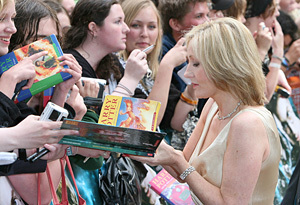
Photo: Getty Images
At the height of Harry Potter mania, Jo says she felt like one of the Beatles. "Except there were four Beatles, so they could turn to each other and say, 'My God, this is crazy,'" Jo says. "I couldn't turn to anyone. So the pressure was insane."
Jo says she knew Harry Potter was getting big when the press started to take notice, but she had no idea how "Beatles-esque" it had gotten until she started her second American book tour. She says she showed up for a book signing and was faced with a horde of screaming fans, lightbulbs going off in her face and a line that stretched for blocks. When she finally left that day—after signing 2,000 books—the line still hadn't ended.
"That's when it started to get crazy," she says. "At that point, I kept saying to people, 'Yeah, I'm coping, I'm coping.' But the truth was, there were times when I was barely hanging on by a thread."
Jo says she knew Harry Potter was getting big when the press started to take notice, but she had no idea how "Beatles-esque" it had gotten until she started her second American book tour. She says she showed up for a book signing and was faced with a horde of screaming fans, lightbulbs going off in her face and a line that stretched for blocks. When she finally left that day—after signing 2,000 books—the line still hadn't ended.
"That's when it started to get crazy," she says. "At that point, I kept saying to people, 'Yeah, I'm coping, I'm coping.' But the truth was, there were times when I was barely hanging on by a thread."
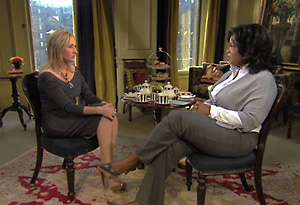
While Jo may have millions of fans around the world, she also has her critics. Some have labeled Harry Potter as being too dark and frightening for children. There have been religious critics who have accused the books of promoting witchcraft, and some have even campaigned for the books to be banned from schools. Jo says she wasn't trying to make a religious statement when she wrote the books.
"I'm not pushing any belief system here," she says. "Although there is a lot of Christian imagery in the books. That's undeniable. But that's an allusion to a belief system in which I was raised."
Jo says she can understand why some parents might find Harry Potter too mature for their children. However, she doesn't think that the topics of witches and magic should be avoided altogether. She says these kinds of stories have been told for hundreds of years, and they will continue to appeal to children for hundreds of years to come because people like the idea behind magic.
"I'm not saying I believe magic is real—I don't," she says. "But that's the perennial appeal of magic—the idea that we ourselves have power and we can shape our world."
"I'm not pushing any belief system here," she says. "Although there is a lot of Christian imagery in the books. That's undeniable. But that's an allusion to a belief system in which I was raised."
Jo says she can understand why some parents might find Harry Potter too mature for their children. However, she doesn't think that the topics of witches and magic should be avoided altogether. She says these kinds of stories have been told for hundreds of years, and they will continue to appeal to children for hundreds of years to come because people like the idea behind magic.
"I'm not saying I believe magic is real—I don't," she says. "But that's the perennial appeal of magic—the idea that we ourselves have power and we can shape our world."

One thing Jo hasn't spoken much about in the press is her first marriage. Before she became one of the world's richest women, Jo led a modest life working as a secretary in London. When Jo was 25, her mother died of multiple sclerosis—sending Jo into an emotional tailspin. Desperate to escape the pain, she moved to Portugal, where she met and married her first husband. Jo eventually gave birth to her oldest daughter, Jessica. The marriage soon came to an end, and Jo packed up her things and moved to Scotland with Jessica.
Despite what she describes as a "short and catastrophic" marriage, Jo says she would do it all again to have Jessica. Eventually, Jo was able to look back on the marriage and see that she has a strong survival instinct. "When I knew that it was time to go, I left," she says. But she says she still felt completely shell-shocked.
"I had a very, very tiny baby, and then I went straight into poverty and depression," she says. "But in a strange way, all of that was enormously illuminating. And I did a lot of thinking after that marriage ended. I did a lot of thinking primarily about me—why things had been as they had been. And it was seven years before I met that right man. But I think it needed to be seven years."
Despite what she describes as a "short and catastrophic" marriage, Jo says she would do it all again to have Jessica. Eventually, Jo was able to look back on the marriage and see that she has a strong survival instinct. "When I knew that it was time to go, I left," she says. But she says she still felt completely shell-shocked.
"I had a very, very tiny baby, and then I went straight into poverty and depression," she says. "But in a strange way, all of that was enormously illuminating. And I did a lot of thinking after that marriage ended. I did a lot of thinking primarily about me—why things had been as they had been. And it was seven years before I met that right man. But I think it needed to be seven years."
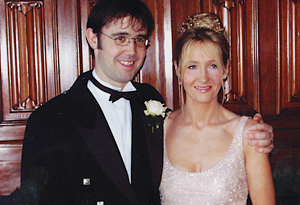
When the right man finally did come around, Jo says she was ready.
A week before she met the man who would become her husband, a good friend asked her what she was looking for in a man. When Jo listed off her basic wants—intelligence, integrity, kindness, a strong sense of self—she says her friend looked at her and said, "Well, that's not going to happen." "[It was] like I'd asked for the earth!" she says. "And I thought, 'Okay, maybe that's not going to happen.'"
Shortly after, Jo did find the man she was looking for. In 2001, she married anesthesiologist Neil Murray in a private ceremony at their home in Scotland. Today, Jo and Neil are raising their three children in Edinburgh, Scotland.
A week before she met the man who would become her husband, a good friend asked her what she was looking for in a man. When Jo listed off her basic wants—intelligence, integrity, kindness, a strong sense of self—she says her friend looked at her and said, "Well, that's not going to happen." "[It was] like I'd asked for the earth!" she says. "And I thought, 'Okay, maybe that's not going to happen.'"
Shortly after, Jo did find the man she was looking for. In 2001, she married anesthesiologist Neil Murray in a private ceremony at their home in Scotland. Today, Jo and Neil are raising their three children in Edinburgh, Scotland.

One person who is not a part of Jo's world today is her father. Though she doesn't often talk about it publicly, Jo says she and her father are currently estranged.
Oprah: Do you think you'll ever make peace?
Jo: No, I don't. I think that it's such a huge thing to be estranged from a parent, but obviously there would have to be very big reasons for that. So that's where I am.
Oprah: Do you have your reasons?
Jo: I have my reasons.
Oprah: Any you want to share?
Jo: It wasn't a good relationship from my point of view for a very long time. But I had a need to please that I kept going for a long time, and then there just came to a point at which I had to pull up and say, "I can't do this anymore."
Oprah: Do you think you'll ever make peace?
Jo: No, I don't. I think that it's such a huge thing to be estranged from a parent, but obviously there would have to be very big reasons for that. So that's where I am.
Oprah: Do you have your reasons?
Jo: I have my reasons.
Oprah: Any you want to share?
Jo: It wasn't a good relationship from my point of view for a very long time. But I had a need to please that I kept going for a long time, and then there just came to a point at which I had to pull up and say, "I can't do this anymore."
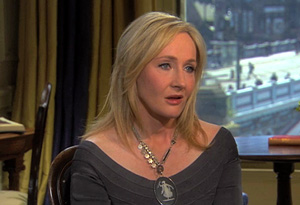
Jo says one of her biggest regrets is that her mother never knew about Harry Potter. Jo started writing the first book about six months before her mother died, but she never told her about it. Jo says it's no coincidence that Harry's own journey throughout the series is to deal with death in its many forms—what it means to die, what it does to those left behind and what it means to survive death.
"If she hadn't died, I don't think it's too strong to say that there wouldn't be Harry Potter," Jo says. "The books are what they are because she died...because I loved her and she died."
Jo says she entered into a long period of depression after her mother's death. It was this struggle with depression that inspired one of the darkest aspects of the Harry Potter books—the Dementors, dark creatures who feed off of human happiness.
"It's so difficult to describe [depression] to someone who's never been there, because it's not sadness," Jo says. "I know sadness. Sadness is to cry and to feel. But it's that cold absence of feeling—that really hollowed-out feeling. That's what Dementors are."
"If she hadn't died, I don't think it's too strong to say that there wouldn't be Harry Potter," Jo says. "The books are what they are because she died...because I loved her and she died."
Jo says she entered into a long period of depression after her mother's death. It was this struggle with depression that inspired one of the darkest aspects of the Harry Potter books—the Dementors, dark creatures who feed off of human happiness.
"It's so difficult to describe [depression] to someone who's never been there, because it's not sadness," Jo says. "I know sadness. Sadness is to cry and to feel. But it's that cold absence of feeling—that really hollowed-out feeling. That's what Dementors are."

Photo: Getty Images
In 2008, Jo gave the commencement speech at Harvard University. She shared how hitting rock bottom became the foundation upon which she rebuilt her life.
"I've often met people who are terrified—you know, in a straitjacket of their own making—because they'd rather do anything than fail. They don't want to try for fear of failing," she says. "[Hitting] rock bottom wasn't fun at all—I'm not romanticizing rock bottom—but it was liberating. What did I have to lose?"
Now with an empire of books, movies and even a theme park, there's no doubt that Jo is now a success. However, she's has been careful to protect the Harry Potter brand. In fact, Jo says Michael Jackson once approached her about making a musical based on the books, and she turned him down. When Universal proposed the theme park to her years later, she told them she only wanted to do it if it was going to be incredible.
"They showed us their ideas, and I thought, 'This could be amazing,'" she says. "And it truly is. I mean, if I had been a reader of the books, I would have wanted to go there."
"I've often met people who are terrified—you know, in a straitjacket of their own making—because they'd rather do anything than fail. They don't want to try for fear of failing," she says. "[Hitting] rock bottom wasn't fun at all—I'm not romanticizing rock bottom—but it was liberating. What did I have to lose?"
Now with an empire of books, movies and even a theme park, there's no doubt that Jo is now a success. However, she's has been careful to protect the Harry Potter brand. In fact, Jo says Michael Jackson once approached her about making a musical based on the books, and she turned him down. When Universal proposed the theme park to her years later, she told them she only wanted to do it if it was going to be incredible.
"They showed us their ideas, and I thought, 'This could be amazing,'" she says. "And it truly is. I mean, if I had been a reader of the books, I would have wanted to go there."
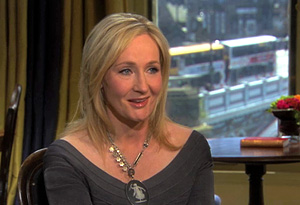
Jo says she planned for a long time to make the last word of the Harry Potter series be "scar." At some point along the way, she changed her mind and wanted the final words to read "All was well." Fans might take comfort in thinking that all was well with Harry and his friends, but only Jo knows for sure what really becomes of them.
Jo: [The characters] are all still in my head. I mean, I could write. I could definitely write an eight, ninth, 10th. I could, easily.
Oprah: You could. Will you?
Jo: I'm not going to say I won't. I don't think I will. I loved writing those books. I loved writing it. So I feel I am done, but you never know.
Jo: [The characters] are all still in my head. I mean, I could write. I could definitely write an eight, ninth, 10th. I could, easily.
Oprah: You could. Will you?
Jo: I'm not going to say I won't. I don't think I will. I loved writing those books. I loved writing it. So I feel I am done, but you never know.
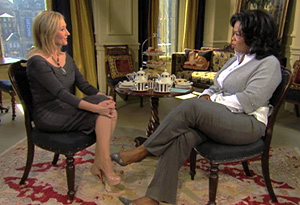
When the Harry Potter series came to an end in 2007, fans all over the world mourned its loss. Jo says that writing Harry Potter helped her through some very tumultuous times in her personal life over the course of 17 years—and when she penned those final words, she went through a long bereavement process.
"Even though I always knew it was going to be seven books—that was it, I always knew it was going to end—when it ended, I was in a slight state of shock," she says.
Initially, Jo says she was "elated" to wrap up the series. However, on the day of Harry's birthday—her own birthday too—she mourned the loss so much that she was crying uncontrollably. She says the only other time in her life that she had cried like that was when her mother passed away.
"If it had been an escape for all these children, you can imagine what it had been for me," she says. "And it was not just the [Harry Potter] world—it was the discipline of working and it was the structure it gave to my life. I knew I'd still be writing, but I had to mourn Harry."
"Even though I always knew it was going to be seven books—that was it, I always knew it was going to end—when it ended, I was in a slight state of shock," she says.
Initially, Jo says she was "elated" to wrap up the series. However, on the day of Harry's birthday—her own birthday too—she mourned the loss so much that she was crying uncontrollably. She says the only other time in her life that she had cried like that was when her mother passed away.
"If it had been an escape for all these children, you can imagine what it had been for me," she says. "And it was not just the [Harry Potter] world—it was the discipline of working and it was the structure it gave to my life. I knew I'd still be writing, but I had to mourn Harry."
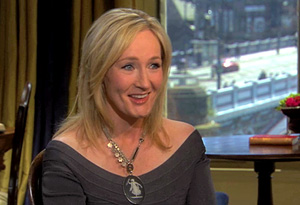
One thing Jo says she knows for sure is this: Love is the most powerful thing of all. This is a central theme that comes across in all the Harry Potter books.
"Love wins," she says. "It does win; we know it wins. When the person dies, love isn't turned off like a faucet. It is an amazingly resilient part of us."
Jo says she's incredibly proud of Harry Potter, but she's ready to move on to the next chapter of her life. She says she'll keep writing because she "literally can't stop," but she doesn't feel the need to top the success of the series.
"It was amazing. It was also insane at times," she says. "And there are parts of that insanity I'll be glad to leave behind. ... I love the people who read the books. I dedicated the last book to the people dearest to my heart, and the second part of that dedication was to the reader who stuck with Harry all the way through."
"Love wins," she says. "It does win; we know it wins. When the person dies, love isn't turned off like a faucet. It is an amazingly resilient part of us."
Jo says she's incredibly proud of Harry Potter, but she's ready to move on to the next chapter of her life. She says she'll keep writing because she "literally can't stop," but she doesn't feel the need to top the success of the series.
"It was amazing. It was also insane at times," she says. "And there are parts of that insanity I'll be glad to leave behind. ... I love the people who read the books. I dedicated the last book to the people dearest to my heart, and the second part of that dedication was to the reader who stuck with Harry all the way through."



